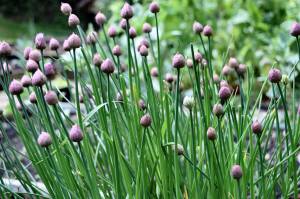Chives are a popular herb that are a member of the onion group. Home gardeners grow chives to use as a garnish in cooking, particularly with eggs, soups, sour cream or grilled meat. Chives have a beautiful soft flavor that does not overpower in the way that parsley or coriander may and I personally never have an omelette without it.
How To Grow Chives
Growing chives is not difficult, but they do need a relatively warm temperature of 19°C (66°F). It will be easiest for most people to grow them inside in a seeding tray with an external heat source keeping the soil warm. Sow the seeds just underneath the surface of the soil at a rate of 10 seeds per square inch.
From there, the chive seedlings can be either transplanted in to soil or in to a container. Growing in soil is easy as they are a tolerant plant. They prefer rich, moisture retentive soil that receives a good amount of sunlight with a bit of shade every now and then. They do not tolerate sandy soils very well, so you may need to prepare your soil with organic matter a month before planting if this is the case.
In winter, chives will die back to the ground. If chives are required over the winter (who doesn’t like bacon and eggs on a cold Sunday morning?), the plant can be transplanted indoors to a pot.
Growing Chives In Pots
They do equally well in containers that are positioned correctly. Transplant in to a pot or window box and position such that the chives receive partial sunlight.
Chives must be watered very regularly, especially if grown in pots. A cup of water per day is recommended. Supplement with a liquid fertilizer every so often if required, but avoid fertilizers high in nitrogen.
In winter, chives will die back to the ground. If chives are required over the winter (who doesn’t like bacon and eggs on a cold Sunday morning?), the plant can be transplanted indoors to a pot.
Harvesting Chives
Chives are harvested simply by using scissors to snip about an inch (2.5cm) above ground level. They can be harvested many times per season and are best used fresh. If needed they can be refrigerated in a sealed bag for around a week.


